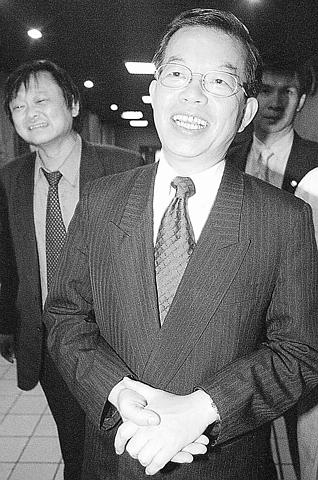With a push from party colleagues, Kaohsiung City Mayor Frank Hsieh (謝長廷) is considering making a run for the DPP chairmanship, announcing yesterday that he would make a decision in two days.
"I will seriously consider the issue and then make a final decision in two days," Hsieh said after a meeting yesterday morning with DPP legislators who had traveled to Kaohsiung to show their support.
While some DPP members are confident Hsieh can win the post, others cautioned him to not take on too much responsibility.

PHOTO: LIAO JUI-HSIANG, LIBERTY TIMES
Hsieh said that if he decided to run he was confident he could handle both the party job and govern the biggest city in southern Taiwan.
"There is no conflict ... I can undoubtedly take on both and do my best," Hsieh stressed.
Hsieh, a former colleague of President Chen Shui-bian (陳水扁), who previously served as a Taipei City councilor and a legislator, has long been deemed a second-tier star in the DPP. A move to run for the party chairmanship -- along with Chen leading the central government -- could be the beginning of a "Chang-Bian" era (長扁共治) [Chang is Hsieh's given name].
After current DPP chairman Lin I-hsiung (林義雄) announced he would not seek another term in July, Hsieh started asking his colleagues' opinions.
The DPP's newly founded Mainstream Coalition, made up of many of Hsieh's supporters, yesterday encourage Hsieh to run for the job.
Other potential candidates, such as lawmaker Yen Chin-fu (顏錦福) and former DPP chairman Yao Chia-wen (姚嘉文) told Hsieh in Taipei last night that they would yield to him. However, in spite of Hsieh's apparent strength, many DPP members are anxious about his situation.
"There is no one to compare to Hsieh within the party ... The real problem is whether he could balance the two posts, when one is based in Kaohsiung and another is in Taipei," said Lee Wen-chung (李文忠), DPP legislative caucus leader.
Lee advised Hsieh to be patient and loyal to his current position.
Hsieh's attempt, meanwhile, drew quick opposition from Kaohsiung City councilors.
People First Party councilors Mei Tsai-hsing (梅再興) and Tsai Ma-fu (蔡媽福) criticized Hsieh for what they called his neglect of Kaohsiung. They warned Hsieh not to place his own interests above those of Kaohsiung, otherwise he stood to lose more than he would gain.
In contrast to Hsieh's soaring status in the DPP, a rising star in the KMT -- Taipei City Mayor Ma Ying-jeou (馬英九) -- appears to be facing challenges within his party.
Although Ma's term will not expire until 2002, some of his opponents within the KMT are already planning to replace him as the party's candidate in the next mayoral election.
Former KMT spokesman Huang Hui-chen (黃輝珍) is reportedly being groomed as a potential rival. Huang does not deny the possibility.
Ma's recent handling of the anti-Lee Teng-hui (李登輝) protests outside the KMT headquarters, accentuated the rift between him and Lee.
KMT insiders now anticipate Ma's standing will suffer within the party.

DAREDEVIL: Honnold said it had always been a dream of his to climb Taipei 101, while a Netflix producer said the skyscraper was ‘a real icon of this country’ US climber Alex Honnold yesterday took on Taiwan’s tallest building, becoming the first person to scale Taipei 101 without a rope, harness or safety net. Hundreds of spectators gathered at the base of the 101-story skyscraper to watch Honnold, 40, embark on his daredevil feat, which was also broadcast live on Netflix. Dressed in a red T-shirt and yellow custom-made climbing shoes, Honnold swiftly moved up the southeast face of the glass and steel building. At one point, he stepped onto a platform midway up to wave down at fans and onlookers who were taking photos. People watching from inside

A Vietnamese migrant worker yesterday won NT$12 million (US$379,627) on a Lunar New Year scratch card in Kaohsiung as part of Taiwan Lottery Co’s (台灣彩券) “NT$12 Million Grand Fortune” (1200萬大吉利) game. The man was the first top-prize winner of the new game launched on Jan. 6 to mark the Lunar New Year. Three Vietnamese migrant workers visited a Taiwan Lottery shop on Xinyue Street in Kaohsiung’s Gangshan District (崗山), a store representative said. The player bought multiple tickets and, after winning nothing, held the final lottery ticket in one hand and rubbed the store’s statue of the Maitreya Buddha’s belly with the other,

‘NATO-PLUS’: ‘Our strategic partners in the Indo-Pacific are facing increasing aggression by the Chinese Communist Party,’ US Representative Rob Wittman said The US House of Representatives on Monday released its version of the Consolidated Appropriations Act, which includes US$1.15 billion to support security cooperation with Taiwan. The omnibus act, covering US$1.2 trillion of spending, allocates US$1 billion for the Taiwan Security Cooperation Initiative, as well as US$150 million for the replacement of defense articles and reimbursement of defense services provided to Taiwan. The fund allocations were based on the US National Defense Authorization Act for fiscal 2026 that was passed by the US Congress last month and authorized up to US$1 billion to the US Defense Security Cooperation Agency in support of the

‘COMMITTED TO DETERRENCE’: Washington would stand by its allies, but it can only help as much as countries help themselves, Raymond Greene said The US is committed to deterrence in the first island chain, but it should not bear the burden alone, as “freedom is not free,” American Institute in Taiwan Director Raymond Greene said in a speech at the Institute for National Defense and Security Research’s “Strengthening Resilience: Defense as the Engine of Development” seminar in Taipei yesterday. In the speech, titled “Investing Together and a Secure and Prosperous Future,” Greene highlighted the contributions of US President Donald Trump’s administration to Taiwan’s defense efforts, including the establishment of supply chains for drones and autonomous systems, offers of security assistance and the expansion of